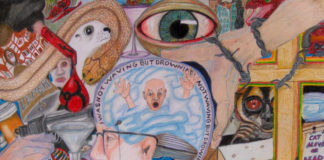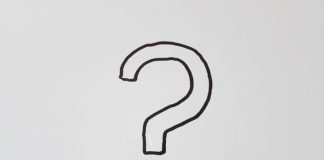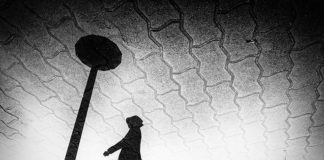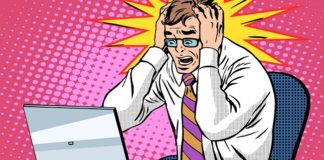Tag: Psychosis
Stepping Into One’s Inner Radiant Space
It is hard to step out of the space of diagnoses because of the power it holds. The “doctor” who inflicted on you the awful label of “schizophrenia” or “bipolar” damages you because of the power he holds.
Original Soteria House Members to Speak!
Soteria House’s history is complex and fascinating. Soteria Houses have never had the support they needed, but they still managed to change so many lives.
My Beautiful Psychosis: A Soul Process
To say a person is out of touch with reality is to ignore the validity of the reality that they are in touch with. This is not only disempowering, but also fails to celebrate the journey that the person is on.
The Mirror Repeats: The Art of Phoebe Sparrow Wagner
It is uncomfortably difficult to look at Phoebe Sparrow Wagner’s art. That much is intentional. She shakes up the viewer’s sense of wellbeing and security so that they can better identify with the plight of the mental patient.
Hearing Voices: Let the Community Lead
A collective knowledge of lived experience is a straightforward answer for improving millions of lives, but it has become clear that it will take an organized community of voice-hearers and their allies to take back credibility and authorship on the narrative of our own lives.
Who Is a Danger to Others: The “Mentally Ill” or the...
If the cultural and socioeconomic structures of society had, from the beginning, allowed me to function, and even thrive, I undoubtedly never would have felt a need for antidepressants and “therapy.”
Validating Psychosis: The Missing Narrative
I am here today because I didn't take the psychotropic medication I was prescribed. Because I didn't accept someone else's narrative about MY story. Because I listened to my voices. Because I let them guide me— into the underworld, and back.
Does Stranger Mean Danger?
Are those diagnosed with “mental illness” more dangerous than other people? Or have we evolved to sense danger from anything that we believe to be different or "strange"?
Recovery: Stressing the Social Basis of the Process
Recovery involves engaging in new material and social contexts and in open dialogues where new ways of understanding and handling the situation are created.
Antipsychotic Trials Show Increasing Placebo Response and Declining Drug Response
A new review of antipsychotic trials conducted over the last 24 years finds that the placebo response rate is steadily increasing, and drug response is decreasing.
The Cost of Being Psychotic in America
People living with psychosis—people like me—are dying because we are being discriminated against by people who’d rather see us hurt than attempt to work with us and give us the decency and respect that should be accorded us as a human right. And nobody deserves to be assaulted or shot after they’ve reached out for help.
Jyl Ion: Awakening as a Medium
Jyl Ion hears voices, but she refuses to view these non-ordinary experiences as a sign of mental illness. Instead Jyl came off 16 years of multiple toxic medications, talks to her ancestor spirits and has reclaimed access to unsanctioned knowledge.
Rachel Jane Liebert: Decolonizing Early Psychosis
Do early psychosis programs serve healing – or function as surveillance and control? Are treatments for paranoia actually themselves forms of paranoia, based on scientific racism and white supremacy?
Does Longer Duration of Untreated Psychosis Cause Worse Outcomes?
New research counters the long-held assumption that a longer duration of untreated psychosis is associated with worse outcomes.
What Can We Learn From the Asylum?
My historical study of the Essex asylum, just outside London, finds that those who were admitted showed significant disturbances of behaviour or evidence of organic disease. Almost two-thirds of those who had psychological, as opposed to organic, disorders were discharged recovered or improved (mostly recovered).
Rethinking “Delusions”: Envisioning a Humanistic Approach to Troublesome Beliefs
A skilled approach to working with beliefs involves both toleration of differences in perspective and an awareness of a variety of possible things that can be tried when a belief is causing problems that do not seem to be tolerable, either to the person or to others with whom they must interact.
Largest Survey of Antipsychotic Experiences Reveals Negative Results
A new survey exploring antipsychotic user experience finds that more than half of the participants report only negative experiences.
Review Explores First-Person Experiences of People Taking Antipsychotics
A new systematic review finds that patients report reduced symptoms but also loss of self and agency while taking antipsychotics.
Mental Health Professionals and Patients Often Disagree on Causes of Symptoms
A new study finds that clinicians’ disregard for mental health patients’ insight into their own condition may be detrimental to treatment.
“Ontological Insecurity” May Play A Role in Psychotic Experiences
In a new study published in the Journal of Clinical Psychology, researchers tested how well “ontological insecurity” predicted psychotic-like experiences (PLEs). They found that...
How Race and Class Impact Schizophrenia and Substance-Use Diagnoses
A new article explores how psychiatric diagnoses are differentially applied to people of different racial and class backgrounds.
Relapse in Antipsychotic Drug Trials is Poorly Defined
There is a lack of consensus in the definition of ‘relapse’ across randomized controlled trials of antipsychotic maintenance treatment for schizophrenia and psychosis.
How Does the Soteria House Heal?
The alternative treatment model of Soteria helps individuals suffering from schizophrenia without relying on medication or coercion.
How Do We Test the Effects of Long-Term Exposure to Antipsychotics?
A new attempt to study the neurological effects of long-term exposure to antipsychotics uses healthy volunteers on minimal doses for 15 days.
Elisabeth: Ayahuasca Psychosis and Spiritual Awakening
After taking the psychedelic drug ayahuasca, Elisabeth went into an extended altered state diagnosed as psychotic. Her terrifying ordeal ignited a spiritual initiation that eventually brought gifts of awakening, insight, and compassion.

































